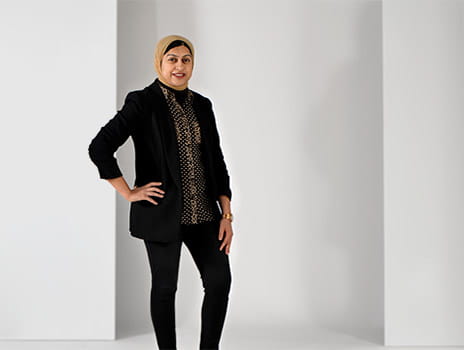- Home
- Research
- Research that Transforms
- Beyond the Bench
- Beyond the Bench 2020
- Shaping the Future of Cancer Treatment
Shaping the Future of Cancer Treatment

Anwaar Saeed, MD, is a rare breed in the field of medicine. She is a physician-scientist, which means she straddles the line between the clinic and the laboratory, treating patients while also conducting academic research.
Physician-scientists are highly trained and deeply focused on their sub-specialties, and they have long been a driving force in medicine. They make up less than 2 percent of the physician workforce and account for 37 percent of the winners of Nobel Prizes in Physiology or Medicine. Traversing the two worlds of research and the clinic, physician-scientists are uniquely qualified to turn their clinical observations into studies, which are called Investigator-Initiated Trials (IITs).
“My studies stem from my experience treating patients,” Dr. Saeed said. “I witness their struggles, and it motivates me to do more. I want to move the field forward and help future patients.”
IITs play a critical role in the development of better, more effective therapies and require an extensive amount of expertise and infrastructure. They almost exclusively take place at National Cancer Institute (NCI)-designated cancer centers. A gastrointestinal medical oncologist, Dr. Saeed focuses her research on immune-based treatments, which she calls the “future of cancer therapy."
“As oncologists, it’s not enough to just treat the patients’ cancer. We must also work to maintain their quality of life,” she said. “We know we can’t live with the side effects of chemotherapy for a prolonged time. That is why I am focused on improving our immunotherapy profile.”
Chemotherapy is usually given in a specific time frame and is not intended for long-term use due to its severe side effects. That creates an opportunity to identify new, better-tolerated therapies to treat cancers that can’t be cured but may be converted into a manageable chronic disease. Dr. Saeed’s first IIT, called CAMILLA, explores a chemo-free combination of Cabozantinib, a small molecule inhibitor that targets multiple pathways in the tumor and tumor microenvironment, with Durvalumab, an immunotherapy drug.
In phase I, Dr. Saeed studied patients with advanced gastroesophageal and colon cancers who had tried standard chemotherapy but did not respond to the therapy. The trial wrapped up in 2020 with promising results, which she presented at the 2020 American Society of Clinical Oncology (ASCO) Annual Meeting.
“One in four patients had tumor shrinkage,” Dr. Saeed said. “We typically don’t see that level of response in phase I trials.”
Based on the favorable outcome seen in phase I, the trial has expanded to a phase II multi-cohort study that is currently open at the cancer center and will open at five other academic cancer centers nationally.
My studies stem from my experience treating patients. I witness their struggles and it motivates me to do more. Dr. Anwaar Saeed
It takes a village
Behind every Investigator-Initiated Trial, there is a robust multidisciplinary team.
“Our IIT infrastructure distinguishes us from other cancer centers, even the centers that are also NCI-designated,” Dr. Saeed said. “There are numerous moving parts to open a single study. Our village of experts allows me and other scientists to focus on the research concept.”
This includes developmental therapeutics, pharmacodynamics and pharmacokinetics experts, who study how the drug is metabolized in the body and interacts with other drugs; interventional radiologists, who obtain baseline and on-treatment biopsies from participants; and translational scientists who analyze the tumor samples and surrounding microenvironment enabling state-of-the-art correlative studies. These in-house experts — and so many more — are vital to every study.
Cancer is complex, and IITs don’t always yield such positive results like Dr. Saeed’s CAMILLA trial. Yet each finding builds on our collective understanding of cancer, regardless of study outcome.
“The resilience of my patients is what inspires me to keep trying. Fighting cancer is a long journey. Therefore, we should prepare for it not as a sprint but as a marathon,” Dr. Saeed said. “We know there is a chance of failure, but it might lead to a groundbreaking discovery. That is why I became a physician-scientist.”